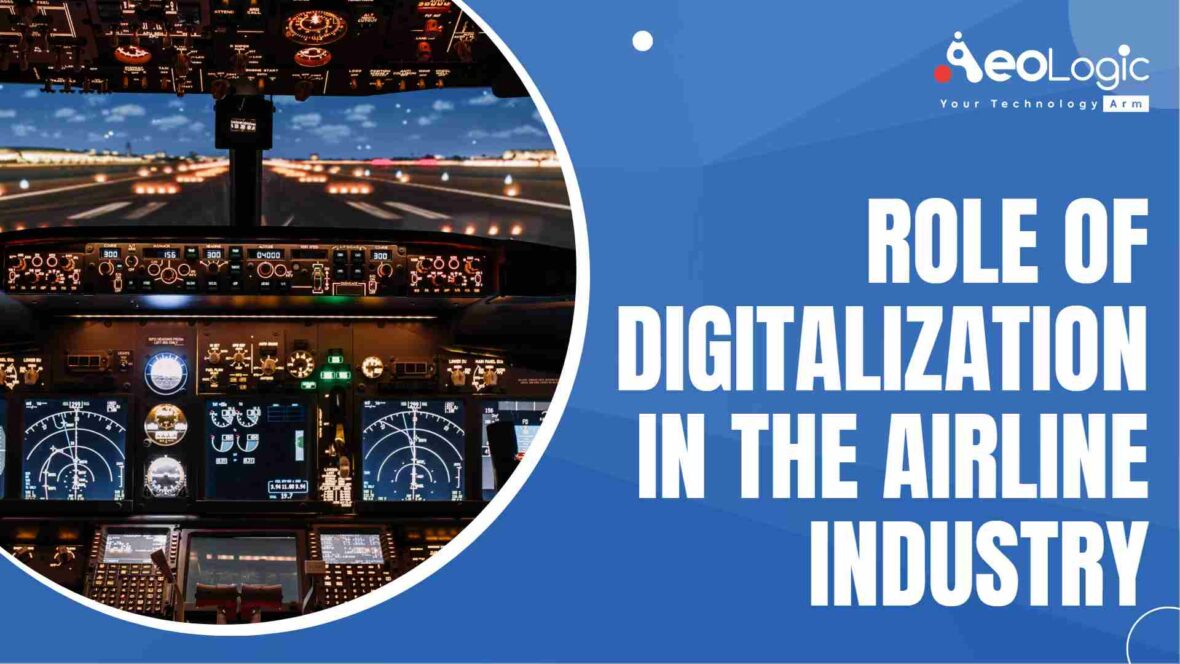As the world community enters a post COVID 19 pandemic reality, defining a definite recovery strategy along with utilizing all available resources will be important to achieving the best “new normal”. In this blog, we will be pinning down the role of digitalization in airline industry.
The aviation industry is no exception to this necessary need, as it involves a wide scope of businesses, including Airports, Airlines, Service Providers, and Equipment Manufacturers. Technological innovation is everywhere around us. From a starting point the strategy is straightforward; improving the efficiency of processes and embracing the latest technologies.
However, one common denominator to both is digital transformation. Implementing technology in our daily life has become indispensable. and it is influencing the digital transformation of many industries, especially aviation. It is an increasing trend to hear business terms such as « smart airports », « self-service airport », or « connected traveller ».
The role of digitalization in airline industry is at the core of every decision being made by airliners, airports, or even service providers. With data-driven business models persistently spreading out to the entire supply chain. Furthermore, implementing software to streamline processes is now one of the most urgent topics that aviation professionals need to think.
Also read: Implementation of RFID in Baggage Operations at Airports
Role of Digitalization in Airline Industry
Most airports and airlines over the globe are providing digital services to travellers. And all of them can be connected once they arrive at the departure lobby. Progress made in this area has been accomplished at high speed. As well as the introduction of AI (artificial intelligence) will continue to grow this trend. Nevertheless, behind the scenes, integrating technology and software for managing ground handling operations is not as common as those used for the traveller experience. Although the use of pen and paper is still the most common practice of doing things among aviation professionals practices.
However, it takes time due to the fact that it impacts a lot of people, from the ground handler to the airport manager, but also the service providers. However, digitalization is able to lead to major benefits at different levels.
The role of digitalization in airline industry, airliners and airports can improve the efficiency of their operations management. All by enhancing employee productivity, reducing costs by saving time and money both on and off the ground. And therefore, augment the customer experience.
Every Minute Costs
Some of you would ask this question: how can you enhance customer experience by digitalizing ground operations processes? Well, that’s quite easy. Let’s take de-icing operations as an example. De-icing is the process of taking away snow, ice, or frost from the wing surface. Whereas, anti-icing is the process of the application of chemicals that not only de-ice but also help keep ice from forming on the wings and vital parts of the aircraft.
De-icing operations management represents a vital moment during the winter period for airlines and airports. Underestimating the significance of this process can drive to delayed flights and safety issues. On the other hand, it can have a direct impact on the customer experience. Therefore, every minute the aircraft is spending on the ground is a minute of additional costs and potential customer dissatisfaction.
Taking the Lead of your Digital Transformation
The role of digitalization in airline industry, using digital solutions specialized in de-icing management is allowing airliners, airports, and ground service providers to reorganize their de-icing process by centralizing all data into a single platform. Eradicating the dependence on pen and paper, manual errors, and delays in receiving important data from agents on the ground. Moreover, the less time you spend on the ground, the more efficient operations gets. The better the customer experience will become and the better airlines, airports, and ground handlers can safely conduct their operations in a cost-effective manner.
Also read: Uses of RFID System to Improve Baggage Handling Efficiency
Wrapping Up
The role of digitalization in airline industry is not a nice-to-have, it is a requirement. Equipping with the right de-icing management software that helps in meeting your requirements in terms of efficiency, mobility, flexibility, and security. These will be leading your company to the next level.
Contact us to know more about the role of digitalization in airline industry.
FAQs
What is digitalization in the aviation industry?
Predictive maintenance helps in accurately predicting when an aircraft or aircraft component will require maintenance. This is promoting proactive maintenance on aircraft, which helps to prevent unexpected repair costs and reduce aircraft downtime. Therefore, leading to time and cost savings.
What is the impact of technology in the airline industry?
Various technologies like pressure checks, lifts, air control, and aerodynamics help in maintaining and flying an aircraft. The wings of airplanes, airfoil, which facilitates the aircraft to fly. The most imperative contribution of technology to the aviation sector is the engine of the plane







